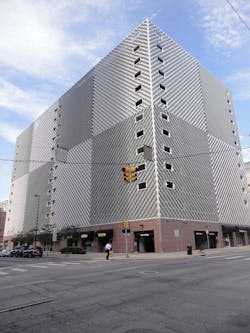Parking structures group launches LEED-type program for parking garages
Responding to the growing desire for more livable communities and rising concern about our planet, the Green Parking Council (GPC), an affiliate of the International Parking Institute (IPI), launched the Green Garage Certification program.
The program is the parking industry equivalent of the U.S. Green Building Council's Leadership in Energy & Environmental Design (LEED) certification, and recognizes and inspires high standards in sustainable parking facility design, technology, operations, and management.
"Green Garage Certification provides both a roadmap and assessment tool for real estate owners, developers, planners, architects, tenants, parking operators, and others to strive toward a more environmentally and economically sustainable future," says GPC Executive Director Paul Wessel.
According to Wessel, Green Garage Certification is a consensus-driven program developed over several years and honed by external reviewers and a beta phase which included more than 40 facilities in the U.S. and Canada.
"Green Garage Certification applies an holistic approach to garage performance and sustainability, evaluating facilities based on their achievement toward a menu of standards developed by experts from a range of related fields," explains John Schmid, chair of the GPC board of directors. "This program demonstrates the parking industry's commitment to a greener future."
Independent, registered Green Garage Certification Assessors are being trained by the GPC and may be tapped to guide applicants through the process, providing varying levels of assistance based on individual needs.
Those interested in pursuing Green Garage Certification can view case studies and download Green Garage Certification at a Glance, along with a free Program Guide, which includes application procedures, program requirements, and a breakdown of criteria by certification level, at greenparkingcouncil.org/certification.
The 195-page, Green Garage Certification Standard, defining the program's performance measures and documentation requirements, can be purchased at greenparkingcouncil.org/certification or in a forthcoming Kindle version on Amazon.
Green Garage Certification is the latest of the parking industry's ongoing sustainability initiatives, spurred by IPI's Framework on Sustainability, a statement of industry-wide goals and organization action items to promote sustainable parking solutions, and a new book, Sustainable Parking Design and Management: A Practitioner's Handbook, available at www.parking.org/greenbook.
Sign up for Building Design+Construction Newsletters
Get the latest news and updates.
